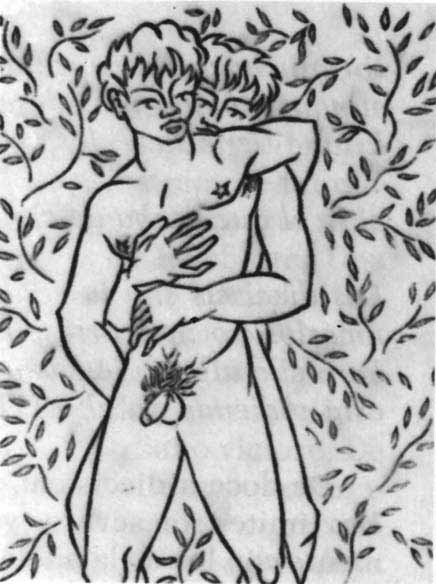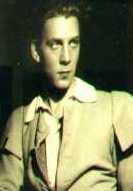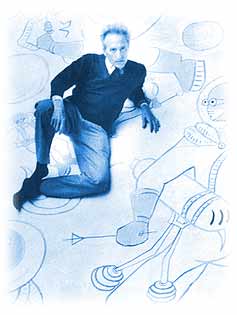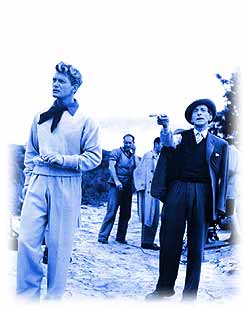I hope no-one's bothered by this title, or thinks it refers to him.
Some visitors to The City have criticised me because I'm chiefly (or solely) interested in aesthetics - in the beauty of adolescents with perfect bodies. Some of my critics reproach me gently, and others can hardly contain their fury.
They say "what about the fat boys who wear glasses and have a plain face? Don't they also have the right love and be loved?"
Either they haven't read the whole site, or they can't read properly.
Because I've never discriminated against those who aren't beautiful, not even for a moment. That would be mean discriminating against myself! Nor do I suggest that
BEAUTY + YOUTH = LOVE = HAPPINESS
Not a bit of it. If they pressed me further I'd almost defend the opposite argument, except that I'd be afraid of getting caught in some tangle of logic.
Just because I used beautiful building-blocks to make The City it doesn't mean that I only made it for young ephebes, or that I'd deprive ugly people of love or happiness.
And I don't only offer my help, affection and love to The Beautiful People: I spend just as much time with my friend Poncho (who calls himself ugly), and helping him resolve his questions about his identity, as I do with Pepe, whose beauty has so far failed to attract the love and happiness he desires so anxiously.

I'd like to mention two cases.
The first is a good friend of mine who's thirtysomething. He thought himself most fortunate to have met, a couple of years ago, a beautiful young boy with the face of an angel.
My friend, Manuel, belongs to the biggest group - neither extremely beautiful nor markedly ugly. But his heart is as big as anything and he threw himself into this relationship, falling head over heals for the boy and making him the centre of his life.
And I've never seen him happy!
He used to tell me "I didn't think I would ever find him, but it was worth waiting all those years to meet my Antinoo and have such a love."
Unfortunately, in real life, there aren't many Antinoos and the problem with being so beautiful is that every moment of every day there is someone who'd like to seduce him. And there are some youths who don't know the value of what they've got, and can't resist the attention people pay them for being young and attractive.
Most of them are almost always tempted to sacrifice their present happiness for the promise of something better in the arms of the first guy who comes along. It's like the story by Alfonse Daudet "La Chèvre du Monsieur Seguín." A young goat is kept tethered in a field where she's safe but she becomes bored. Seeing her unhappiness, Monsieur Seguín allows her into the other fields where she wants to be but, inevitably, the wolf appears from the forest and eats her up.
As with Madame Bovary, no love satisfies them, and they don't know how to appreciate what happiness they already have. It's rushing forward blindly, without purpose or reason, convinced (I think) that the best is yet to come, at the hands of someone other than the man who's at their side.
A few weeks ago, Manuel realised that Antinoo was getting involved with another man, who phoned and wrote a lot. "What hurts me most," said Manuel, "is that when we're together and the other man calls his mobile, Antinoo moves away so I won't hear their conversation, and then he pretends that it was some boring friend from school. As if I were such a fool that I couldn't tell he's deceiving me and being unfaithful with someone else."
Manuel went on, between his sobs, "Although he still loves me, in his way, I couldn't be happy with him. If he said "I love you," I wouldn't be able to tell if he was deceiving himself or if I was deceiving myself.
And he'd ask me "Is all the love I gave him not enough? What more could I give him? My life?"
I don't mean that all handsome boys are uncontrollably promiscuous and unfaithful, just because they're always being asked. There must be some (I'd like to think so) who know how to appreciate the love they have and don't follow other siren calls.
The second case I'd like to mention is a homosexual couple who I have the good luck to know these twenty years. I went to see them for my work, and got to know Jacques, a Belgian, who's a talented decorator, and a charming fellow of about 50, very good looking and athletic.
After a few minutes, there appeared in the living room a boy of about 18 or 20, small and thin, rat-faced boy with dark skin. I remember thinking: "Well, well, the boy looks nothing like his father."
But I soon discovered, from the way they behaved towards each other, the way they listened and watched each other, that they weren't father and son but lovers.
In time I became quite friendly with them, and one day when Jacques and I were alone in the room, he admitted to me:
"Henry, in my business, as you can imagine, I've known many young men, some of them very, very beautiful. I'm an aesthete. I like beauty in whatever form it takes and I like to surround myself with it. But, no-one has loved me as much as Pedro does, no-one could ever love someone as much as I love him. Please believe that, for me, he is the most beautiful person in the world."
Jacques and Pedro are for me the image of what a couple should be, and the way love could be between two men.
I know that however perfect a body may be, there is an inner beauty that is deeper and lasts longer. So don't think any better or worse of those who lack physical beauty, that formal beauty that's like the front page of a newspaper.
And in my heart of hearts, I'm certain that I'd always prefer affection without beauty instead of beauty without affection.
This is the message I'd like to send to all the youths who lose their head over a pretty face or a muscled body:

|
TURN YOUR GAZE ON SOMEONE UGLY!
LOVE SOMEONE UGLY! |

|
Henry
back

